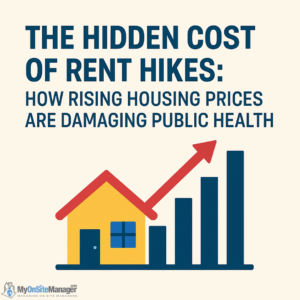When we think of rising rent, we often focus on financial strain—tight budgets, cutbacks, and difficult decisions. But behind the numbers is a far deeper consequence: a growing health crisis among renters. According to a new study published in Social Science & Medicine, excessive rent increases aren’t just an economic burden—they’re a public health threat.
The research reveals that when rents jump sharply, tenants are more likely to suffer from poor physical health, chronic stress, anxiety, and even depression. With nearly half of U.S. renters already cost-burdened (spending more than 30% of their income on housing), the findings shine a light on a critical, yet often overlooked, side of the housing affordability debate.
What the Study Revealed:
The study, led by researchers at the University of California, San Francisco and Princeton University, tracked the health of more than 6,000 renters across several years. Key findings include:
-
Rent increases over 10% were significantly associated with higher levels of psychological distress and self-reported poor health.
-
Rent hikes of this magnitude were especially damaging for low-income tenants and households with children.
-
Health impacts included sleep disturbances, chronic stress, increased blood pressure, and poor diet—all linked to housing instability.
One tenant featured in the study, a single mother of two, described the “constant pressure” of not knowing if she’d be able to afford rent the next month. “It’s like a weight that doesn’t go away,” she said. “Even when nothing is happening, I’m anxious about what might.”
The Ripple Effect of Housing Insecurity:
Rent increases don’t just stretch budgets—they force trade-offs. When housing becomes unaffordable, people are more likely to:
-
Skip doctor’s appointments or medications
-
Cut back on healthy food
-
Delay or avoid mental health care
-
Live in substandard conditions that may worsen respiratory and physical illnesses
This cycle of financial stress and declining health creates long-term consequences, both for individual families and for the healthcare system as a whole.
For parents, the impact is even greater. Children raised in rent-burdened households face a higher risk of experiencing developmental delays, school absenteeism, and emotional instability. Stable housing is foundational for a child’s sense of safety—and when that stability is threatened, everything else is too.
A Public Health Issue, Not Just a Housing Crisis
Public health experts are now advocating for housing to be treated as a core social determinant of health. In cities where rents have spiked dramatically, local hospitals and clinics are seeing the impact first-hand. Some have even started screening patients for housing insecurity during medical visits.
Housing advocates argue that rent policy should no longer be siloed from health and social services. Strategies like:
-
Rent stabilization and caps
-
Expansion of housing vouchers
-
Increased investment in affordable housing
-
Legal support for tenants facing eviction
…can all contribute to not only housing stability but improved health outcomes.
It’s Time to Rethink Our Housing Priorities
As debates rage over rent control, zoning laws, and housing development, one thing is becoming increasingly clear: the cost of inaction is measured in more than dollars. It’s measured in worsening health, fractured families, and lost potential.
We often say, “Home is where the heart is,” but perhaps more accurately, home is where health begins.
If we’re serious about building healthier communities, housing must be part of the conversation—not just in terms of affordability but in terms of dignity, stability, and wellness.
Final Thoughts:
As rent prices surge in markets across the country, this research reminds us that housing policy is health policy. By protecting renters from excessive increases and promoting housing stability, we’re not just preserving their homes—we’re safeguarding their futures.
Source:Excessive Rent Increases Harm Physical and Mental Health – Yahoo News

